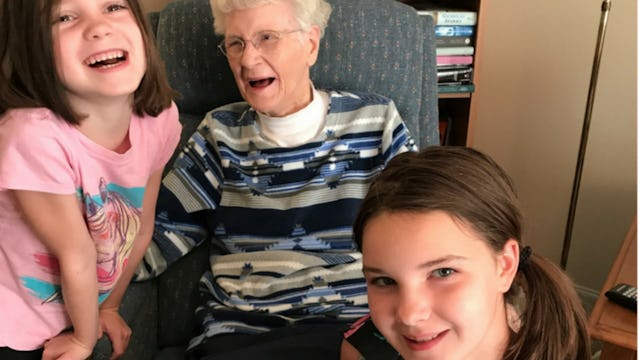What My 95-Year-Old Grandma Taught Me About Compassionate Parenting

I sat on the floor of my grandma’s independent living apartment, playing cards with my mom and one of my daughters. It was day 9 of our trip back home to the Midwest to visit my parents, aunts, uncles, cousins, and grandmother, and my other daughter had already melted down due to a collapsed domino tower (sooo surprising, that ending) and sat pouting on the couch.
We see my grandma about once a year, so our hours spent together are particularly meaningful. In other words, one does not want to see them contaminated by the behavior problems that are par for the course when traveling with school-aged children. I’m sure you can see where this is going.
My card-game-playing child was growing irritable. Mainly because I have this maddening habit of frequently winning games out of pure luck, and while I wasn’t trying to be overly strategic or aggressively competitive, I refuse to throw a card or board game with a child past the age of, say, 4. I had won three games in a row, and it looked like I was headed for a fourth. She was not happy. In fact, she had escalated her grumpiness to the next level and was beginning to hurl irate and hostile words directly at me. Between rounds of the game, I calmly informed her that she and I would be taking a break on the patio outside.
Her behavior was embarrassing. She was on the verge of a temper tantrum she was too old for, she was being blatantly rude to me, and it was obvious I had failed to instill good sportsmanship in her. I wanted to spare us all any further indignities in front of my parents and grandma.
As soon as the door shut behind us, she burst into tears. “I know exactly what you’re going to say!” she sobbed. She listed a number of things that were, in fact, exactly what I was going to say. She was embarrassing me. She was being rude. She was being a poor sport. I let her cry for a minute while I tried to compose my words.
Without raising my voice, I confirmed that, yes, she was embarrassing me and herself. That I completely understood the disappointment and frustration of losing a game, but that I refused to let her treat me that way.
Then the door slid open and my grandma came outside. She sat down in the chair next to my daughter, who was nearly hyperventilating through her tears.
“The hard thing about games is that they don’t always turn out the way we want,” she began. “You’ve just been running around and around these past days, haven’t you?” she added, acknowledging the toll our traveling had taken.
Then she said the absolute perfect thing.
“We all love you.”
My daughter cried harder.
“Do you need to hear that from your mom too? That she loves you? Would that help?”
In many other circumstances, I would have taken offense to another adult suggesting what I might or might not say during a stressful parenting situation. But in that moment, it was just the gentle reminder I needed to hear.
“I do love you, honey. No matter what you say or do, no matter how badly you behave, there is nothing you can do that will make me love you any less.”
My daughter sat in my lap and cried for a few more minutes, then we moved on and salvaged the evening. We even finished our card game before going out to dinner. She was slightly embarrassed that her great-grandmother had come out to witness her emotional display, but I reminded her that Grandma had actually said just the right thing: that we all loved her, no matter what.
I’m not an advocate of enduring crappy, inappropriate behavior from our kids. I don’t ignore rude or disrespectful language. But there are times when compassion is more important than being right. And I suspect that at this stage of her life, my grandma sees that truth more clearly than the rest ositef us do.
Our children are people. Imperfect people, like we are. People who become disappointed, frustrated, people who feel out of control sometimes, people who experience humiliation. They are people who deserve compassion. In the height of an airport meltdown of my own the next day, I appreciated the compassion of another mom traveling without her kids. I can’t imagine if she had chastised or shamed me; what I needed was her acceptance and kindness to help me calm down on my own.
While it’s important to hold kids accountable for inappropriate and disrespectful behavior, they too deserve compassion, kindness, and understanding when they show us their dark sides and their struggles. That day, instead of subjecting my daughter to a stern lecture on good sportsmanship and emotionally tidy public behavior, I’m so grateful my 95-year-old grandma intervened and reminded me to take the path of compassion.
This article was originally published on